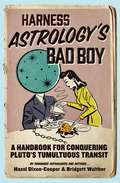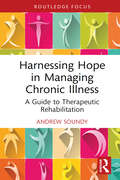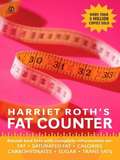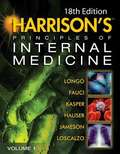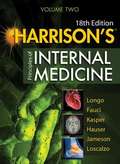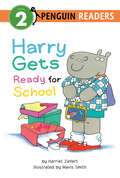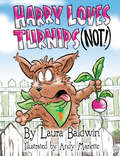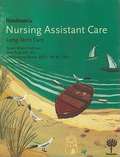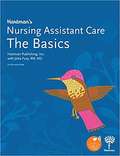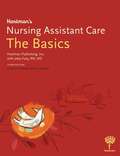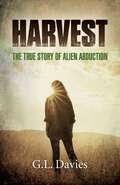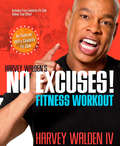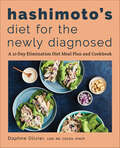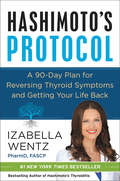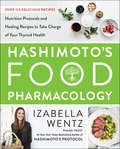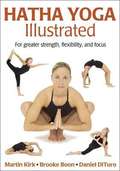- Table View
- List View
Harness Astrology's Bad Boy
by Hazel Dixon-Cooper Bridgett WaltherDon't let your life be bullied by Pluto. Discover how to domesticate astrology's bad boy and master the transition into the Pluto era.Pluto, the planet of transformation, is in transit in Capricorn through 2024, awakening a tidal force of change. The last time we saw this combination, the world felt the impact in the Revolutionary War that birthed America. In this wickedly funny guidebook, world-renowned astrologers Hazel Dixon-Cooper and Cathleen Bridgett Walther are here to show you how to use this unique time to overcome fear, guilt, regret, and self-punishment, and find your place in the cosmos. Their in-your-face advice and step-by-step instructions will help you unlock the heroic part of your soul and flourish in every aspect of your life. Pluto's transit in Capricorn presents all of us with a series of cosmic wakeup calls--bringing a unique opportunity to overcome our most difficult and ingrained traits. Begin now with Harness Astrology's Bad Boy, and you will emerge this Pluto transit stronger, wiser, and more in control of your life than ever before.
Harnessing Hope in Managing Chronic Illness: A Guide to Therapeutic Rehabilitation
by Andrew SoundyHarnessing hope is fundamental to adapting to a chronic illness or palliative illness, and this fascinating book provides a new framework that will enable physiotherapists and other healthcare professionals to engage with patients to create better interactions and outcomes for rehabilitation.Based on extensive research into how patients express their experiences, it identifies those factors that influence how hope can be used to benefit an interaction. It also considers central questions to illustrate how interactions can be psychologically mapped to assess emotions, adjustment, and hope. The book then features practical guidance on how to integrate the idea of hope into therapeutic conversations with patients, fostering acceptance and adaptation to the present, and looking towards the future.This book will interest any practitioner working with patients experiencing chronic pain or palliative illness, as well as students across physiotherapy, occupational therapy, and community nursing. It may also interest any general readers facing challenges around trauma or loss.
Harper's Encyclopedia of Mystical and Paranormal Experiences
by Rosemary Ellen GuileyThe A to Z guide of mystical and paranormal experiences.
Harriet Roth's Fat Counter (Revised Edition)
by Harriet RothA new revised edition of the bestselling Fat Counternow with updated material on trans fats, carbs, and sugar! Americans have more food choices and more to watch out for than ever. Research suggests that trans-fat, carbohydrates, and sugar can be major diet-busters. It's key to cut down on dietary fat and saturated fat in particular, and watch food labels. In this third revised edition of her bestselling guide, Harriet Roth offers the additional feature of trans fat, sugar and carb counts-and updates her listings to include the newest supermarket products, fast food, and restaurant foods.
Harrison's Principles of Internal Medicine, Volume 1 (18th Edition)
by Anthony S. Fauci Tinsley Randolph Harrison Stephen L. Hauser J. Larry Jameson Dennis L. Kasper Dan L. Longo18th Edition of the medical book.
Harrison's Principles of Internal Medicine, Volume 2 (18th Edition)
by Anthony S. Fauci Tinsley Randolph Harrison Stephen L. Hauser J. Larry Jameson Dennis L. Kasper Dan L. Longo18th Edition of the medical book.
Harry Gets Ready for School (Penguin Young Readers, Level 2)
by Harriet ZiefertEverybody has a lot to do before school starts, and so does Harry. He has to go for a checkup, visit the dentist, get a haircut--and that's only the beginning!
Harry Loves Carrots
by Laura Baldwin Andy MarletteHarry playfully teaches children to love their carrots. The inspiration is Harry, a real dog, who really likes carrots and the belief that the health of our children begins in the garden. In a loving and fun filled way, Laura Baldwin, the author of the evolving "I Love My Vegetables" stories, has created a giggling garden of vegetable and edible flowers that people of all ages can enjoy. This is a book that will have children and the young at heart saying "Harry Loves Carrots and I love Harry. Please pass the carrots."
Harry Loves Greens
by Laura Baldwin Andy MarletteThe inspiration for "Harry Loves Greens" is Harry, a real dog, who really likes his greens, coupled with the belief that the health of our children begins in the garden. In a loving and fun filled way, Laura Baldwin, the author of the evolving "I Love My Vegetables" stories, has created a giggling garden of vegetable and edible flowers that people of all ages can enjoy. This book, the second in the series, will have children and adults alike saying "More greens, please."
Harry Loves Turnups (Not!)
by Laura Baldwin Andy MarletteHarry, a real dog who loves his vegetable, is back again. This time there is a problem as Harry loves his turnips, not. The book, the third in a series, is a fun filled read about all the ways to convince Harry to love his turnips. Yes Harry does finally love his turnips, but not until he finds a big surprise in his garden. The wonderfully illustrated pictures of Harry and his friends will have you smiling, no matter what your age.
Hartman's Nursing Assistant Care: Long-Term Care
by Jetta Fuzy Susan Alyare Hedman Suzanne RymerA comprehensive nursing assistant training textbook which includes information on long-term care, multiple chapters on home health care, and material on subacute and acute care. In addition it includes in-depth information on resident and client rights with sidebars that teach ways to promote independence and prevent abuse and neglect; a discussion of culture change; infection prevention; anatomy and physiology with an emphasis on normal changes of aging; updated nutrition information on MyPyramid, special diets, and feeding techniques; current information on legal issues, such as HIPAA and the Patient Self-Determination Act; 7 chapters on home health care, including information on medications, safety, infection prevention, mothers & newborns, and meal planning and preparation; a chapter containing subacute and acute care information, including pre- and post-operative care, as well as mechanical ventilation, chest tubes, and artificial airways.
Hartman's Nursing Assistant Care: Long-Term Care (2nd edition)
by Hartman PublishingWelcome to the world of health care. Health care is a growing field. The healthcare system refers to all the different kinds of providers, facilities, and payers involved in delivering medical care. Providers are people or organizations that provide health care, including doctors, nurses, clinics, and agencies.
Hartman's Nursing Assistant Care: Long-term Care and Home Care (Second Edition)
by Hartman PublishingThe second edition of Hartman Publishing's most comprehensive nursing assistant training textbook includes information on long-term care, as well as multiple chapters on home health care, and some material on subacute and acute care. This edition of the textbook contains: - In-depth information on resident and client rights and special boxes throughout that teach ways to promote independence and prevent abuse and neglect - New information on person-centered care and culture change - Up-to-date, comprehensive material on infection prevention - Many new photos and more website resources - Material on anatomy and physiology with an emphasis on normal changes of aging and observing and reporting - Updated nutrition information on MyPlate, special diets, and feeding techniques - Current information on legal issues, such as HIPAA, the Patient Self-Determination Act, and the Elder Justice Act - 7 chapters on home health care, including information on medications, safety, infection prevention, mothers & newborns, and meal planning and preparation - 1 chapter containing subacute and acute care information, including pre- and post-operative care, as well as mechanical ventilation, chest tubes, and artificial airways - Chapter-ending material which develops critical thinking, as well as tests the chapter - Significantly expanded testing section available to instructors, including 31 chapters exams, two final exams, and a critical thinking exam, along with a practice exam for students taking the certification test - A table of procedures, common abbreviations list, a special appendix with a math review, and a glossary
Hartman's Nursing Assistant Care: The Basics
by Hartman PublishingThe fifth edition of Hartman Publishing's briefest nursing assistant training textbook just 10 chapters contains essential information for working in long-term care. Information is explained in everyday language, with a focus on helping students pass the certification exam. Many new full-color photographs and illustrations reinforce the content. This textbook contains the following: Material organized by body system this includes each system's structure and function, normal changes of aging, how the nursing assistant can help with normal aging changes, observing and reporting, and common diseases and care guidelines Issues relating to Residents' Rights and person-centered care emphasized throughout in special boxes Up-to-date, comprehensive material about infection prevention New information about electronic documentation More information regarding mental health disorders Updated information about hypertension and new material about obtaining an electronic blood pressure reading New icon to indicate the skills that have a corresponding video Comprehensive nutrition information, including MyPlate material, updated special diets section, and feeding techniques Current information about legal issues, such as HIPAA and advance directives Many new website resources throughout and a comprehensive community resources box Significant testing section for instructors, including 10 chapters exams, two final exams, and a critical thinking exam, along with a practice exam for students taking the certification test A table of procedures, common abbreviations list, and a glossary
Hartman's Nursing Assistant Care: The Basics (3rd edition)
by Hartman PublishingWelcome to the world of health care. Health care happens in many places. Nursing assistants work in many of these settings. In each setting similar tasks will be performed. However, each setting is also unique. This textbook will focus on long-term care
Harvest: The True Story of Alien Abduction
by G.L. DaviesG.L Davies invites you to join him on his most terrifying investigation yet. In 2009 one woman from Pembrokeshire believed she was abducted by aliens. What followed was a terrifying ordeal of alien visitation, nightmarish visions, encounters with terrifying creatures, a connection to the past and a prophecy of destruction on the scale never before seen in Pembrokeshire&’s peaceful history. Should these events be true, then no one is safe. The harvest has begun… 'Masterfully written and a terrifying true journey into Alien Abduction. The benchmark for all paranormal accounts from the greatest paranormal author of his time.' Mysterious Radio
Harvey Walden's No Excuses! Fitness Workout
by Harvey WaldenGet into the fight—the fight against fat! The U.S. Marine drill instructor who has inspired millions through the massively popular TV show, Celebrity Fit Club, reveals his star-studded formula for lifelong health and fitness. Countless marines have trained with Drill Instructor Walden—and now you can too. Harvey offers a workout so simple, you can do it watching your favorite TV show, and so effective, it will change your life. In Harvey Walden's NO EXCUSES! Fitness Workout, he becomes your personal drill instructor for a platoon of one—YOU! All he asks is that you give him half an hour a day, four days a week, to develop a new body, a new attitude—and a new you. The tough marine from Chicago's South Side tells of his own personal challenges and the lessons he's learned. He will teach you how to get beyond your excuses and meet the challenge of getting fit. Harvey knows all about excuses—from rookie marines to Hollywood celebrities, he's seen every trick in the book. He knows just how hard people will try to AVOID getting fit. But he also knows that if you get off your butt, leave behind that sugary, salty, snacky food you've been chewing on, and follow his recipe for exercise success, you'll turn your life around. He knows because he's done it. And you can do it too! In this book, he sets out a complete three-stage fitness plan for YOU: Stage One: Get OFF Your Butt. Stage Two: Now You Are in the Fight. Stage Three: OOH RAH! You're a Stud (or Studette)! With thirty-minute workouts for each level of fitness that keep you in motion while taking you through warm-up, cardio, strength training, and cool-down, each stage will hone and tone your body, introducing new challenges as you get fitter. A bonus gym section can take you further still. And Harvey gives his very own personal advice at every stage. So—No Excuses! It's time to get in the fight.
Hashimoto's Diet for the Newly Diagnosed: A 21-Day Elimination Diet Meal Plan and Cookbook
by Daphne OlivierA stress-free diet and lifestyle guide for managing your Hashimotos diagnosisWhile a Hashimotos thyroiditis diagnosis is an essential first step toward taking control of your health, it can be overwhelming. What's more, implementing lifestyle changes like an elimination diet, especially when you're struggling with severe symptoms like fatigue and unexplained weight gain, can feel formidable. But, rest assured, Hashimoto's Diet for the Newly Diagnosed is your helpful companion to getting on the right path to a healthy, symptom-free life, starting with what you eat.With 75 healing recipes and a 3-week meal plan complete with shopping lists, this Hashimotos diet cookbook has everything you need post-diagnosis to prepare delicious meals that will nourish your body and help alleviate your Hashimotos symptoms. By starting off with a simpler approach to the traditional elimination diet, Hashimoto's Diet for the Newly Diagnosed will teach you how to listen to your body and build your "You Diet" for optimal health and well-being.This complete Hashimotos diet cookbook and meal plan for beginners includes:Easy-to-digest science—Understand the ins and outs of your Hashimotos diagnosis, including the critical connection between this thyroid condition and your diet.Comforting and nourishing recipes—From breakfast to dinner to snacks, these recipes call for familiar ingredients and may require less than 30 minutes to make, can be made in one pot or pan, or are ideal for doubling and freezing for a quick meal any day of the week.Building a support system—Learn which questions to ask your healthcare practitioner, how to effectively communicate the details of your Hashimotos diagnosis with loved ones, and more.If you've been recently diagnosed with Hashimotos thyroiditis, here's the all-in-one cookbook and meal plan that's perfect for you.
Hashimoto's Protocol: A 90-Day Plan for Reversing Thyroid Symptoms and Getting Your Life Back
by Pharmd. Izabella WentzDr. Izabella Wentz, the author of the phenomenal New York Times bestseller Hashimoto’s Thyroiditis, returns with a long-awaited, groundbreaking prescription to reverse the symptoms of this serious autoimmune condition that is becoming one of the country’s fastest growing diseases.More than thirty-five million Americans currently suffer from Hashimoto’s—an autoimmune disease that affects the thyroid gland and causes the body to attack its own cells. To alleviate the symptoms of this debilitating condition—including chronic cough, acid reflux, IBS, allergies, chronic pain, hair loss, brain fog, and forgetfulness—patients are often prescribed synthetic hormones that have numerous life-altering side effects. But there is a better way. Diagnosed with Hashimoto’s at twenty-seven, pharmacist Dr. Izabella Wentz knows first-hand the effects of the disease, as well as the value—and limitations—of medication. The key to improved health, she argues, involves lifestyle interventions. In Hashimoto’s Protocol, she outlines a proven treatment that has helped thousands heal and many others feel better—in as fast as ninety days.Drawing on her own personal experience as well as her work consulting with thousands of patients, Hashimoto’s Protocol offers a practical pathway for healing and reversing the autoimmune damage at the root of the disease. The first step is a quick-start two-week detox that includes foods to eat and inflammatory foods to avoid, advice on supplements to support the liver, and an adrenal recovery plan. Next, readers create a personalized plan with foods, supplements, and other lifestyle interventions tailored to their body’s own unique Hashimoto’s triggers, which they can identify using self-tests included in the book. Hashimoto’s Protocol also features original recipes.Grounded in the latest science, Hashimoto’s Protocol is the first book to offer a proven protocol by an acknowledged expert in the field to treat this condition without dangerous hormones—and help sufferers reclaim their lives.
Hashimoto’s Food Pharmacology: Nutrition Protocols and Healing Recipes to Take Charge of Your Thyroid Health
by Izabella Wentz PharmD.“When I was in pharmacy school, I discovered that food has a profound impact on our healing and that what we put in our bodies will either heal us or make us sicker. In the same way that we use pharmaceuticals to impact our biology, we can use food as our medicine. I call this concept food pharmacology. Food is one of the most powerful tools in your healing journey.” - Dr. Izabella WentzMore than 35 million Americans currently suffer from Hashimoto’s—the country’s fastest-growing autoimmune disease, which affects the thyroid gland and causes the body to attack its own cells. Many individuals with or without a formal diagnosis suffer daily symptoms, including chronic cough, acid reflux, irritable bowel syndrome, allergies, persistent pain, hair loss, brain fog, and forgetfulness. Hashimoto’s Food Pharmacology combines Dr. Izabella Wentz’s revolutionary and proven approach to reversing thyroid symptoms with delicious, easy-to-use recipes that delight the taste buds while they heal the body. Inside you will discover:• 125 delicious and nutritious recipes for salads, smoothies, bone broths and crockpot and bibimbap-style meals, with thyroid-supporting nutrient details on every page• Over 100 stunning food and lifestyle photographs• Tips for revamping your kitchen and pantry• An FAQ for easy reference and quick answers• Easy-to-use, personalized meal plans and food rotation schedules to accommodate any diet Successfully transforming the lives of thousands, Dr. Izabella Wentz makes it easier than ever before to live a life free from the suffering of autoimmune disease.
Hatha Yoga Illustrated
by Brooke Boon Martin KirkThis book provides practical, detailed information on Hatha Yoga for both beginners and practitioners, which can be used throughout their daily life.
Hatha Yoga con buon senso: consigli dimenticati
by Apo Halmyris Lisa RaspantiIl moderno yoga occidentale dovrebbe essere analizzato sulla base di criteri sé stanti. Le regole dimenticate delle Asana e del prANAyAma appaiono forse esotiche oggigiorno e la Kundalini sembra essere addormentata nel suo nido senza tempo. Ma attenzione: “Un legno marcio non si può intagliare” (Confucio). È chiaro che lo “yoga occidentale” non è lo Hatha Yoga che ha le sue radici nello Yoga Darsana e in Patanjali. L’essenza di questo culto apparentemente edonistico ed egocentrico del fitness viene plasmata da chi lo insegna e da chi lo pratica. Un momento per guardarsi allo specchio.
Hatha Yoga con sentido común: consejos olvidados
by Alicia L. Alonso Apo HalmyrisEl yoga moderno y occidental debe analizarse en sus propios términos. ¿Las reglas clásicas, ya abandonadas, de Asana y prANAyAma resultan exóticas hoy en día? Kundalini parece dormir en su nido atemporal. Pero, cuidado: "la madera podrida no se puede tallar" (Confucio).
Hatha Yoga: Quelques conseils oubliés
by Apo HalmyrisHatha yoga : une question de bon sens Retour sur les origines du yoga, sur ses fondements. A partir de là, analyse théorique et pratique du yoga tel qu'il peut être pratiqué de nos jours. (asanas, mais aussi Pranayama, Mudra et quelques notions apportées sur la Kundalini et les chakras)
Hatha Yoga: The Body's Path to Balance, Focus, and Strength
by Ulrica Norberg Andreas LundbergFor the 16.5 million yoga practitioners in America, Swedish yoga instructor Ulrica Norberg's fresh look at Hatha yoga ("the way of the body") will be a perfect entrée to the art of exercising to produce a strong mind and a harmonious soul. Focusing on pacing, not perfection, Norberg explains proper breathing and asanas, poses developed to increase consciousness, relaxation, strength, and concentration. Throughout, she maintains a thoughtful balance between philosophy and instruction, and offers step-by-step directions and wisdom for personal and communal well-being. Lavishly illustrated with gorgeous full-color photographs, Hatha Yoga is sure to inspire beginning and advanced yoga practitioners alike.
